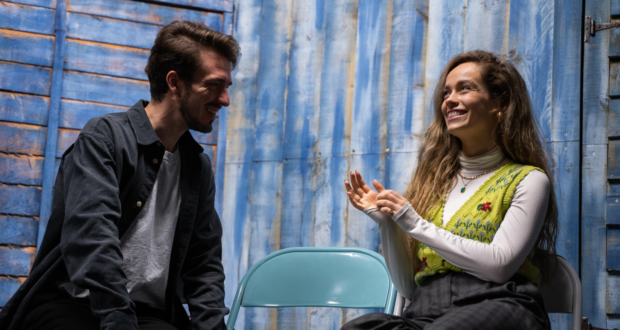Us presents the beginning and end of a relationship. Utterly believable, the play cuts to the heart of what it is to have loved and lost with excellent acting and a tight script. This is moving and beautiful theatre.Summary
Rating
Excellent
The lights on stage flicker into life, current fluctuating through the bulbs, while a static buzz fills the space. Illuminated is Man (David Persiva), lounging on a sofa. Empty beer bottles lie at his feet, cluttering the living room of a millennial Londoner’s flat. It’s relaxed. Woman (Niaomh Morgan) enters, returning home from a day of work and immediately there’s familiarly mundane domestic tension. Why hasn’t he bought more toilet roll? How come we’ve run out of milk? Has he actually done any work today? The strains and pains of a long-term relationship weigh heavily over the scene.
And then suddenly the voltage wavers, the lights flicker once more and we’re transported back to the very beginning. Us shows us the top and tail of a three-year romance: the first 30 minutes and the final half hour. The script wanders freely between the two, showing the frisson and promise of a first meeting with one hand – one of those nights when you just talk and talk into the small hours. With the other, we’re fed the slow implosion of that same promise, the connection now riddled with guilt and frustration. Persiva’s script handles it beautifully.
The world is incredibly well created. With 75 minutes spent in the company of only the two actors, there really is nowhere to hide. Only occasionally is the connection in the timelines slightly blurred: the relationship perhaps feels too similar at the start and end. But almost every aspect of the production weaves a rich tapestry of the characters and their lives. The set feels properly lived in, and the writing adeptly hops between the time-periods, connecting the two with small Easter eggs of context from an early scene revealed later: they’re not significant moments but they all play into creating properly fleshed-out feeling. The result is engaging. Both actors are on fine form, with Morgan in particular magnetic, using a subtle physicality to draw the lines of a love that fades into contempt.
Despite this, I found myself waiting for the play to take a step up. With the final moments of the relationship already revealed, the tension occasionally seeped from the piece. I looked for the story to tackle something beyond the relationship, and for a moment it seemed it might. Both characters share stories of previous sexual encounters where lines of consent didn’t feel right; later Man twists her story as a cruel, crude guilt trip. I hoped this theme would grow as the play developed, but it faded away.
Real life isn’t like that though. The everyday accidents, worries and troubles we experience rarely grow to be defining moments of our lives. Fewer still stand out to us as representative social commentary. The slower parts of the play may lack tension, but does that make them less real? As Man struggles to come to terms with rejection, I saw much of myself in him. Persiva is at his best in these painful, moving moments.
The stand out scene: a power cut at the house party. Total darkness. The young lovers whisper a fragile conversation, the electricity between them clear. The lights flicker and we see the energy – that intangible thing – glow and dim, just beyond our grasp, yet captured by its enactment in this moving piece of work.
Written by: David Persiva
Directed by: David Frias-Roble
Produced by: Gianna Kiehl
Lighting Design: Joe Underwood
Sound Design: Ben Paveley
Set Design: Maeve Reading
Us plays at White Bear Theatre until 19 February. Further information and bookings via the below link.
 Everything Theatre Reviews, interviews and news for theatre lovers, London and beyond
Everything Theatre Reviews, interviews and news for theatre lovers, London and beyond



